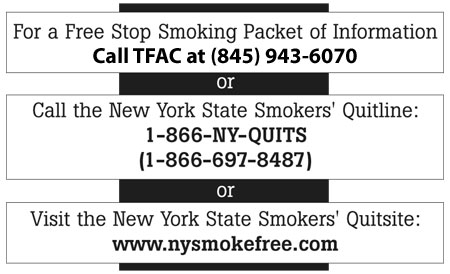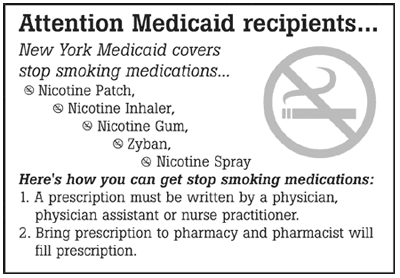Quit Tips and Information
Ready to STOP SMOKING? We're Ready to Help!


Quitting Tips...
- Set a firm quit date...but make sure it’s no longer than four weeks from the time you begin to cut down.
- Smoke fewer cigarettes each day...until you smoke half the number you usually smoke. Then stop smoking altogether.
- Take fewer and smaller puffs from each cigarette that you do smoke.
- Switch brands frequently...it helps break the feeling that your chosen brand is your “best friend”.
- Give up your “favorite” cigarettes first...the one after meals (brush your teeth and use a mouthwash afterwards), the one while you drive (thoroughly clean your car out, including the ashtray, and then when you quit, put the money that you would have spent on cigarettes in your car ashtray every day), and the one when you talk on the telephone.
- Keep lifesavers, gum, straws and carrot sticks handy. They can help.
- Give yourself a treat for stopping. Go to a movie, go out to dinner or buy yourself a gift.
- Be prepared to feel the urge to smoke. The urge will pass whether or not you smoke. Use the FOUR Ds to fight the urge:
- • Delay
• Deep Breathing
• Drink Water
• Do Something Else
After Quitting...
- 20 minutes after quitting...
your heart rate and blood pressure drops.
- 12 hours after quitting...
the carbon monoxide level in your blood drops to normal.
- 2 weeks/3 months after quitting...
your circulation improves and your lung function increases.
- 1 to 9 months after quitting...
coughing and shortness of breath decrease; cilia (tiny hair-like structures that move mucus out of the lungs) regain normal function in the lungs, increasing the ability to handle mucus, clean the lungs, and reduce the risk of infection.
- 1 year after quitting...
the excess risk of coronary heart disease is half that of a smoker's.
- 5 years after quitting...
your stroke risk is reduced to that of a nonsmoker 5 to 15 years after quitting.
- 10 years after quitting...
the lung cancer death rate is about half that of a continuing smoker's. The risk of cancer of the mouth, throat, esophagus, bladder, cervix, and pancreas decrease.
- 15 years after quitting...
the risk of coronary heart disease is that of a nonsmoker's.



